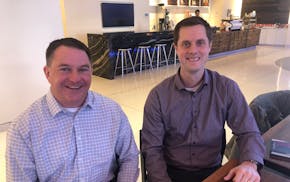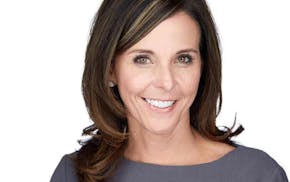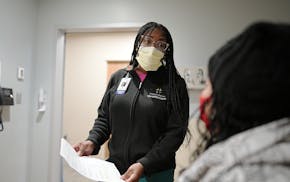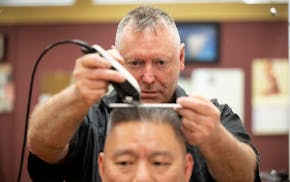Last year, CEO Anissa Keyes moved the headquarters of her Arubah Emotional Health from leased space in Brooklyn Center to north Minneapolis.
Keyes grew up on the North Side, graduated North High in 1994, and recently built a house for her family on a vacant lot.
"I needed to ground this business," Keyes said of Arubah, which employs 15, including contract therapists. "North Minneapolis is where I'm invested and where my services are most needed."
Arubah, a Hebrew word that stands for health restoration, occupies a formerly vacant medical clinic in the Camden neighborhood.
It also has satellite offices at several North Side nonprofits.
Arubah provides mental health services in a community that struggles with sometimes traumatic issues of race, low-income households, drugs, violence and the need to upgrade education and skills.
"Seeking help is the first step toward a healthier life," said Keyes, a social worker and family therapist who once struggled with addiction herself.
Arubah's opening is another step forward on the North Side. And Keyes is another of the entrepreneurs adding value along the North Side's commercial arteries of Plymouth, West Broadway and Lowry avenues. From the opening of the new headquarters for Thor Cos. and MEDA, to expansion of Juxtaposition Arts, the gains can be lost amid the headlines and sound bites about the neighborhood's crime and despair.
The lender who financed Arubah's new headquarters is the Community Reinvestment Fund (CRF), the low-profile, nonprofit financier that has gotten traction as one of the nation's 100-largest Small Business Administration-backed lenders.
"Anissa is the perfect fit for our mission," said Jennifer Ericson, CRF's director of business development. "We saw not only her ownership and status [as a minority woman], but she was heavily involved in north Minneapolis and providing badly needed services.
"She saw this dilapidated building, but with good bones. It could be improved. It took us more than a year, but we got the loan approved and closed last year. She's not an accountant, but we worked with her. And the principal and interest she's now paying are not that much more than what she was paying in rent. She is passionate about her business. And she has built that business over several years against all odds."
CRF made a $211,000 loan on the building, plus $50,000 for the rehab through a city of Minneapolis development agency low-interest loan. Keyes invested $30,000 in the project.
Moreover, Keyes worked with the neighborhood business developer, Northside Economic Opportunity Network, and others, to attract a few other small businesses in the health business that are leasing space from her. A small cafe in the building is expected to open next year.
"We're not cash-flowing this building quite yet," said Keyes. "But Arubah is doing well. We're secure. This community needs me and I need the community. I also go to church here and my kids go to school in this neighborhood."
Across the river
In St. Paul's slowly rebounding Payne-Phalen neighborhood, CRF this year made a loan to a Somali grocery that opened in an empty storefront, which means neighbors no longer need to bus to Frogtown to buy special African groceries and halal meats. Karibu Deli and Grocery is on its way to employing 10 people. And CRF loaned $500,000 to the African Development Center, the nonprofit business adviser and small-loan financier that works with scores of Twin Cities immigrant businesses.
CRF, which operates in Minnesota, Detroit and other states, in fiscal 2018 made 66 business loans of $32.6 million, most in low-income communities to female or minority owners, who make up the largest group of emerging businesses owners in America.
"I wanted an enterprise that would scale meaningfully," said CEO Frank Altman, a CRF founder in 1988. "We've done $2.5 billion in financing across SBA lending, community-loan securitization, tax credits sales [over 30 years] … We think we can double that over the next five years."
Altman, who conceived of CRF as a way to buy up and sell community-development loans to institutional investors, providing liquidity in a market that was then overlooked by private underwriters, has survived a couple recessions and evolutions in its business model.
The Minneapolis-based nonprofit, which employs 65, had a surplus of $627,000 in fiscal 2017 on $26.2 million in revenue from operations and about $5 million in grants from corporate and foundation investors who partner in CRF's mission to create businesses and jobs in historically underinvested communities.
Altman, who earned a salary of about $310,000 last fiscal year, oversees one of the largest Community Development Financial Institutions (CDFI), as designated by the U.S. Treasury.
CRF works through community-based nonprofit developers, foundations, municipalities and financiers in 49 states.
It has partnered with several Detroit banks, the Kresge Foundation and others to create a $150 million mortgage fund that now constitutes 10 percent of the home loans in that born-again, block-by-block residential market.
And it is a pioneer between CDFIs nationally and Minneapolis-based U.S. Bank and a growing list of large lenders who provide funding and counseling that benefits fledgling tiny businesses that are not yet "bankable" through a growing national initiative called "Connect2Capital."
Neal St. Anthony has been a Star Tribune business columnist and reporter since 1984. He can be contacted at nstanthony@startribune.com.

St. Anthony: 'Patient' investing paying off for St. Paul's Hill Capital

Jennifer Smith, leader of Burnsville's Innovative Office Solutions, has died

St. Anthony: Medical professions in Minnesota need more people of color in their ranks



